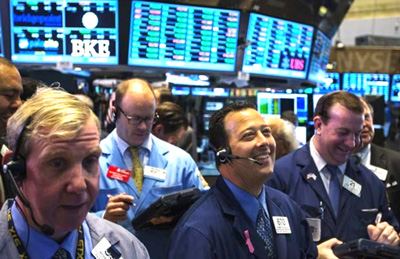
Global stocks post best week since Nov
New York, July 13, 2013
Stocks on major bourses posted their best weekly gains since November on Friday, helped by corporate earnings reports and remarks by Federal Reserve officials calming investor fears about US monetary policy.
On Wall Street, the Dow and S&P 500 hit all-time closing highs for a second day, and the S&P 500 rose for a seventh straight day, matching a winning streak from March. The index climbed 3 per cent for the week, its best weekly per centage gain since early January.
Stocks, bond prices and commodities have rallied this week while the dollar tumbled on hints from Federal Reserve chief Ben Bernanke that the US central bank was unlikely to phase out its stimulative bond buying before the US unemployment rate improved further.
"The momentum has been incredibly strong ... At some point, a breather or some sort of consolidation makes sense," said Joe Bell, senior equity strategist at Schaeffer's Investment Research in Cincinnati.
The MSCI world index was up 0.1 per cent for the day and 3.4 per cent for the week, its best weekly per centage gain since November, while the broad FTSEurofirst 300 ended down 0.1 per cent.
The Dow Jones industrial average ended up 3.38 points, or 0.02 per cent, at 15,464.30. The Standard & Poor's 500 Index was up 5.17 points, or 0.31 per cent, at 1,680.19. The Nasdaq Composite Index was up 21.78 points, or 0.61 per cent, at 3,600.08.
Stronger-than-expected results from top US banks JPMorgan Chase and Wells Fargo helped boost the market, while shares of United Parcel Service Inc. dragged on the S&P 500 after a disappointing outlook. UPS, the world's biggest package delivery company, and smaller rival FedEX are considered economic bellwethers because of the high volume of goods they move around the world.
Boeing shares, also a drag, fell 4.7 per cent to $101.87 after a Dreamliner operated by Ethiopian Airlines caught fire at Britain's Heathrow airport on Friday.
Investors were nervous about holding onto positions ahead of the release of Chinese second-quarter economic growth data, due before European markets open on Monday, which will be particularly important to the mining sector.
After a week of swings in the world's big currencies, foreign exchange markets traded more calmly.
The dollar index, which measures the greenback's performance against a basket of major currencies, was up 0.2 per cent. It was down 1.8 per cent for the week, its worst decline since early June.
"There is some argument for suggesting that the shock effect of a dovish Bernanke has largely been digested," said Alan Ruskin, global head of foreign exchange strategy at Deutsche Bank in New York.
"Even if he tries to avoid changing his tone, any policy surprises are more likely to be in a positive dollar direction than the reverse," he said.
US Treasuries prices slipped on profit-taking and pre-weekend position-squaring. Benchmark 10-year Treasury notes were unchanged in late trade, yielding 2.59 per cent. Earlier, they were up as much as 15/32, with a yield of 2.518 per cent.
Gold eased for the day but notched its biggest weekly advance in nearly two years.
Analysts said, however, that recent gains in US equities amid some positive signs for the economy and no indications of abatement in outflows from gold-backed exchange-traded funds could pressure the metal.
"The fact that the leading US equity indices closed at record highs yesterday - which could prompt investors to switch once again from gold ETFs to equities - is problematic for gold," said Eugen Weinberg, head of commodity research at Commerzbank.
Many commodity markets have had a strong run this week as talk of continued central bank support has bolstered hopes of a pickup in global growth.
Oil prices ended with sharp gains for the day, led by the biggest surge in gasoline futures this year as a string of refinery outages stoked concerns about fuel supplies.
Brent climbed $1.08 to settle at $108.81 while US crude oil rose $1.04 to settle at $105.95 a barrel.
Portuguese government bonds fell again after Lisbon requested a delay in the next review of a bailout program due to the country's political crisis.
Tensions were reignited this week after Portugal's president threw out plans that seemed to have patched up a government rift and instead demanded some kind of grand coalition, which would include opposition Socialists, who have been calling for snap elections.-Reuters







